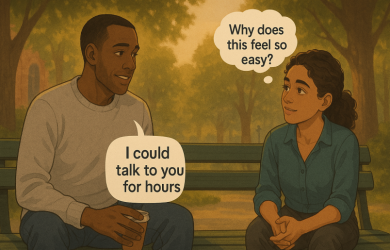Frustration Attraction: What It Means and How to Deal With It

Heal & Grow Daily for a Happier Relationship
Subscribe FREEKey Takeaways
Marriage.com AI Quick Summary
In the tricky world of love, sometimes the people who don’t seem to want us end up being the ones we fall for the hardest. This surprising twist is rooted in attraction psychology. It sounds odd, doesn’t it? Why would someone not returning our feelings make us like them even more?
Yet, frustration attraction happens more often than we might think. This situation can lead to emotional frustration, especially when our affection only grows as someone keeps us at arm’s length. This dynamic between frustration in relationships and increased attraction shows a fascinating side of how our emotions work.
It reveals that our hearts sometimes follow a puzzling path, where denial from others stirs deeper feelings within us. This article helps us understand the complex nature of attraction and the emotional frustration that can come with it.
What is frustration attraction?
Frustration attraction is a psychological phenomenon where individuals find themselves more drawn to someone who is elusive or unresponsive to their affection. This form of attraction often emerges from the complex interplay of psychological attraction and emotional attraction dynamics.
Essentially, when someone does not reciprocate feelings, it can paradoxically increase the desire and interest of the person who feels rejected. This is partly because the challenge and uncertainty ignite a deeper curiosity and fascination about the person who is denying affection.
Moreover, frustration attraction highlights significant relationship challenges, as it can lead to a cycle of pursuit and withdrawal that complicates emotional connections.
This dynamic is compelling as it taps into a fundamental aspect of human behavior—our tendency to want what we cannot have. Understanding frustration attraction helps in recognizing how these patterns influence our relationships and the emotional landscape of our interactions.
What causes frustration attraction?
Frustration attraction happens when we find ourselves drawn to someone who doesn’t return our feelings. It’s like the more they pull away, the more we want to get closer.
Experts say that when we get rejected, we often start to doubt ourselves. We might even think that the only person who can make us feel better is the very person who did not want us.
This feeling can make us want their approval even more, even though it hurts to be turned away.
This can be confusing, but several factors play into why this happens:
-
Mystery and challenge
Mystery and challenge play a crucial role in frustration attraction. When someone is perceived as “hard to get,” they may appear more desirable due to the inherent human trait of curiosity. We naturally seek to uncover the unknown, which fuels our attraction to individuals who are elusive or mysterious.
This curiosity keeps us engaged as we strive to understand more about them and decode their behavior.
Example: Consider a person who occasionally shows interest in you but remains aloof most of the time. Their unpredictable attention might intrigue you, prompting you to think more about them and try to win their consistent interest.
The challenge of deciphering their mixed signals can make them seem more interesting and attractive than someone who is readily available and predictable.
-
Self-validation
Self-validation is another key aspect of frustration attraction. Sometimes, the desire to attract someone who seems disinterested is driven by the need to prove one’s worth. This scenario can be particularly potent when one’s self-esteem is challenged by the other person’s lack of interest.
According to Danica Mitchell, a sex therapist:
Some people tie attraction with accomplishment; being able to “win someone over” can feel very alluring.
Successfully winning their affection may be perceived as a validation of one’s desirability and worth.
Example: If you’re attracted to someone who doesn’t seem to reciprocate your feelings, you might persist in your efforts to get their attention as a way to validate your self-worth.
For instance, someone might continue to pursue a colleague who is initially indifferent to them, believing that earning their affection will prove their own attractiveness and value within their social or professional circle.
-
Idealization
Idealization occurs when there is limited direct communication or emotional reciprocity from the person of interest. In such cases, the lack of information may lead to idealization, where one fills in the missing details with positive attributes and fantasies.
This mental construction often portrays the person as more perfect or ideal than they might actually be in reality.
Example: Imagine someone you know only casually through occasional encounters at social events. Their reserved nature and limited interaction might lead you to idealize them based on the little you observe, such as their polite demeanor or attractive appearance.
In the absence of deeper knowledge, you might imagine them to have qualities like great intelligence, kindness, or compatibility, which may not necessarily align with their true character.
FAQs
Dealing with complex emotions in relationships can be challenging. Here are answers to some frequently asked questions that might help you navigate your feelings more effectively and make sense of your emotions.
-
How do you deal with frustration attraction?
To deal with frustration attraction, acknowledge and reflect on your feelings, set realistic expectations, and distance yourself if needed. Focusing on personal growth and seeking support from friends can also help you manage these intense emotions.
-
How do you know if you have feelings for someone?
You might have feelings for someone if you find yourself constantly thinking about them, seeking their company, and feeling a rush of happiness when interacting with them. Emotional and physical reactions such as excitement, nervousness, or a desire to impress can also be indicators.
-
How do you deal with frustration in love?
Dealing with frustration in love involves clear communication with your partner about your feelings and concerns. It’s important to express yourself honestly and patiently listen to their perspective. Taking a step back to evaluate the situation and seeking mutual understanding can also alleviate frustration.
-
What to do when you like someone else while in a relationship?
If you find yourself liking someone else while in a relationship, it’s crucial to assess your current relationship’s health and your feelings. Reflect on what your attraction to another person might be indicating about your needs and desires. Communicating with your partner openly and honestly is key to resolving such feelings.
Embracing clarity in emotions
Frustration attraction highlights the complex dynamics of our emotional world, where denial can unexpectedly deepen our affection. Understanding this phenomenon is crucial in managing our feelings effectively and making healthier relationship choices.
Danica Mitchell highlights that:
These are not always the healthiest dynamics. If this is a recurring pattern, you should potentially seek professional support.
By acknowledging and reflecting on these feelings, setting clear boundaries, and focusing on personal growth, we can navigate these emotional waters with greater resilience. Embracing this knowledge empowers us to foster more genuine and fulfilling connections, turning challenging emotions into opportunities for self-discovery and emotional growth.
Want a healthier, happier relationship - one step at a time?
 Tips
Tips
Write your tip or submit a video tip
All tips are reviewed before the publishing.
Share this article on
Recent Articles
Related Quizzes
Heal & Grow Daily for a Happier, Healthier Relationship
Subscribe FREE on YouTube We'd love your feedback!
We'd love your feedback!
 Expert Q&A
Expert Q&A
Ask your question related to this topic & get the support you deserve from experts.





















 Thanks for your feedback!
Thanks for your feedback!